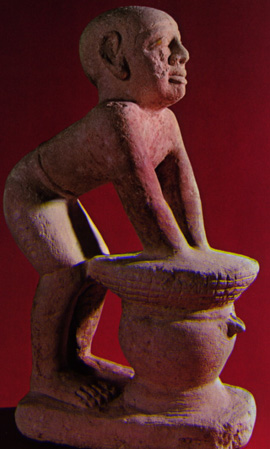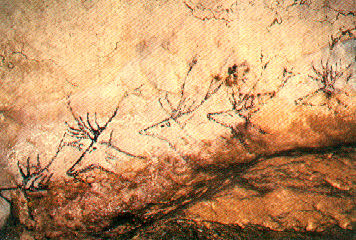 Greek
GreekEtymology of technology
 Greek
Greek
téchne
.jpg)
"I hate my craft, I hate the skill of my own hands."
Hephaestus in Aeschylus' Prometheus Bound
Applied science or any skill in doing work, or specifically a sort of professional competence as opposed to instinctive ability or mere chance.
As defined by Aristotle the use of tekne implies purposeful activity geared for production; as such it was a form of knowledge that could be taught and learned.
Origins of the term | Lascaux cave art | chronological thought | chronology | chronological terms
History of Technology: Week One
![]() To join together, link, fit, tie, press, harness, weave, stick, thread or meld together.
To join together, link, fit, tie, press, harness, weave, stick, thread or meld together.
The systematic understanding of how connecting material parts to into a workable whole functions to solve problems, create opportunities and reduce perils.
The origins of technical
skills are usually associated with gods, demigods or culture heroes who bring
skills or techniques as gifts from superhuman characters to men and women capable
of mastery.
"The attitude towards technology in the Greek myths is particularly revealing...."
Pursell, p. 31; Lascaux Cave painting, 35,000 - 40,000 years old.
craft | Lascaux cave art | chronological thought | chronology | chronological terms
In many classical stories we have, you may recognize that there is a strong bias--called a "Promethean theme"--against the facility of technological inventions that bring novel power to humans. This is a balanced bias from the Greek perspective because it unites the good and the bad into a dramatic story of courage and defiance of divine order.
Ancient Greek writers felt that any instruments or devices when used carried within them vast new capacities that required humans to adopt new abilities and develop a mastery of different skills to harness the device or else the misuse of the implements could cause widespread harm, pain, or destruction.
In this critical tradition, Plato incorporates craftsmanship and the knowledge that must accompany tools into more than one dialogue. For example in Phaedrus he speaks of consequences. See the primary document Phaedrus on line...
This sense of the Promethean theme suggests to me that societies and their crafts people must rise to the occasion created by new tools or be swept aside by the power inherent in these implements to change a culture. The story of the Hittites and the Egyptians who met on a great battlefield in what is today Palestine (Gaza) is a tale of how the bronze weapons of the Pharaoh's army from Egypt was no match for the superior iron weapons of the Hittites from Anatolia. There is a consequence to the use of any technology, and the theme here is that the cost can be involved in the fateful loss of empires.
These themes are evident in the story of Pandora's box, Daedalus and Icarus, or Odysseus and the Trojan horse. Clearly writers who survive to our time were using instruments as a warning. Ignorance of the use of these devices brought with it grave consequences. Among the consequences are death, the fall of Troy, the great ancient commercial center on the Bosporus straight, and the origins of worldly suffering. Clearly the Promethean theme suggests that for every great advancement there comes with it a greater, or as great a consequence. Some ancient Greeks believed that you could not get something in return for nothing.
Origins of the term | craft | Lascaux cave art | chronological thought | chronology | chronological terms
Historical periods as watersheds in technical change
Stone Age is the name given to the period when stones were the basic material for tools:
early is "paleolithic"
new or recent is "neolithic"
Bronze Age is the name used when most tools were largely made of copper alloyed with tin.
Iron Age refers to the period after bog ore and iron was used for weapons and key tools.
Origins of the term | craft | Lascaux cave art | chronological thought | chronology | chronological terms
Pursell | Pacey–World| Pacey–Meaning | Tenner | Postman | Eberhart | Snow | Kaku
 |
||
|---|---|---|
| Tools of Toil: what to read. | ||
| Tools are historical building blocks of technology. | ||